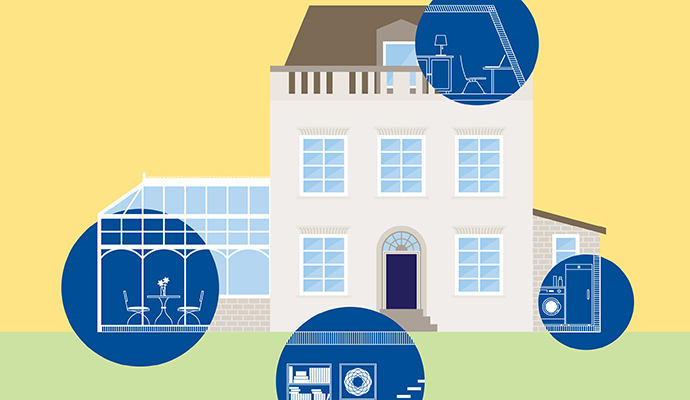How to achieve your big-picture money goals
Stay focused!

A free daily email with the biggest news stories of the day – and the best features from TheWeek.com
You are now subscribed
Your newsletter sign-up was successful

One University of Scranton study found that spending less — and saving more — was the third most common New Year's resolution of 2014. But turning a new page isn't always easy. Obstacles can get in the way, and then motivation inevitably begins to wane.
Fortunately, it's never too late to get yourself back on the right path — the key is to refocus your efforts on reaching that goal.
We tapped economist and behavioral finance expert Dr. Hersh Shefrin, author of Beyond Greed and Fear: Understanding Behavioral Finance and the Psychology of Investing, to show us how he'd help three people struggling to stay motivated redouble their efforts toward achieving their top money dreams.
The Week
Escape your echo chamber. Get the facts behind the news, plus analysis from multiple perspectives.

Sign up for The Week's Free Newsletters
From our morning news briefing to a weekly Good News Newsletter, get the best of The Week delivered directly to your inbox.
From our morning news briefing to a weekly Good News Newsletter, get the best of The Week delivered directly to your inbox.
Big-picture money goal #1: I want to pad my emergency fund
Michael Flanagan, 33, TV producer, St. Petersburg, Florida

"About two and a half years ago, I left the safety of a full-time job as a television producer to start my own business. I was fortunate to have enough money socked away (about $25,000) to get my freelance career off the ground and running.
But doing so wiped out my savings.
A free daily email with the biggest news stories of the day – and the best features from TheWeek.com
My biggest financial goal right now is to build my emergency fund back up to where it once was by the end of 2015. Today, that balance sits at around $16,000.
As a freelancer, my current strategy is to simply say yes to almost every single job I'm offered. While this has definitely helped generate the income I'm after — about $10,000 a month — I sometimes feel overworked and exhausted.
Lately, I've been starting to wonder if saving the remaining $9,000 in just one year is truly a realistic goal. Is there anything else I could be doing to reach my target in this timeframe without working myself to death?"
Shefrin's big-picture analysis: "When creating a solid emergency fund, there are two important questions people like Michael should ask themselves: Am I in good health? And is my business fairly reliable?
If you anticipate a lot of health care expenses, or if your income stream is more volatile, you may want to set a higher target for your emergency fund. People with relatively stable jobs should aim to save between six to nine month's worth of net income, but if your income is unpredictable, you may want to shoot for nine to 12 months' worth.
Ultimately, ratcheting up your saving comes down to understanding your spending. What is it about your consumption habits that's making it difficult to save a bit more? In other words, what are the non-essential components of your budget?
There may be purchases that look small from week to week for Michael, but are purely discretionary and add up to a significant chunk of money each year that he could be contributing to his emergency fund.
To tackle this issue, you need to have a bird's-eye view of your overall spending patterns over a 12-month period to see what fraction of your income you're spending on, let's say, eating out. Simply curbing this habit could free up over $900 a year."
Now for his motivational advice: "People in Michael's situation would benefit from thinking about the timeline for their goal, then set smaller milestones and benchmarks — building in rewards along the way.
If making lifestyle sacrifices to finance a big goal feels tough, narrowing your focus to keep your eye on the next benchmark can make it easier.
Rewarding yourself with little indulgences whenever you meet a milestone will also help minimize feelings of deprivation — just be sure that the rewards you give yourself aren't so big that they derail your overarching goal.
For example, if you've eliminated eating out in order to meet your big goal faster, a reasonable mini-splurge might be one night out at your favorite restaurant. That certainly won't break the bank.
Another motivation booster might take the form of confiding in someone whose respect means a lot to you, which helps build in extra accountability. Share your plan and see if that person is willing to get regular progress reports. If you've got someone you trust, respect and admire, you naturally won't want to disappoint that person.
If Michael still needs help keeping up his motivation, he should take a moment to pretend that he's experienced a real financial emergency. Is his safety net solid enough to see him through? If not, this little trick could really help put him back in the right mindset to keep saving."
Big-picture money goal #2: I want to renovate my home
Rachel Jimenez, 26, operations manager, Rancho Cucamonga, California

"My husband and I bought our first home — an older, three-bedroom, two-bath cottage-style house — a little over two years ago. We love it, but there's no denying that the place needs work.
For starters, the shower in the second bathroom can't be used because it leaks. The kitchen is outdated, the windows throughout the house aren't energy-efficient and the house could use new pipes.
While I haven't priced out all of the specifics, it's probably safe to guess that completing these projects will likely cost tens of thousands of dollars.
We currently pull in over $100,000 a year, and have about $5,000 in our emergency fund. The big goal is to tackle these home improvements, but we've only been able to set aside $2,000 so far.
Looking at the laundry list of work the house needs can feel overwhelming, and we just don't know where to place our focus. Which projects should take priority? And what changes can I make to finally start moving closer to the finish line?"
Shefrin's big-picture analysis: "The first order of business is to break down this gigantic goal into more manageable chunks. Instead of looking at the whole list, just focus on three projects — and then rank order them in importance.
Obviously, major issues (a leaky roof) will take priority, but for projects lower on the to-do list, Rachel can consider opening a high-yield savings fund earmarked for home improvements. So if she decides to wait three years to tackle that kitchen, since the money's locked up for the next two years, it will yield a higher rate of return.
Another idea is to cut individual home-improvement projects in half. So instead of feeling overwhelmed by having to do the entire kitchen at once, spend a couple of years saving — then replace things like the appliances or the cabinets in one shot.
Once that's finished, repeat the process again after saving for the remaining renos. Chances are, reaching the halfway mark will so stoke her enthusiasm for wrapping things up that she'll save faster for the big payoff: the kitchen of her dreams."
Now for his motivational advice: "As I said before, long journeys begin with first steps. But if taking the time to save for home improvements is dimming Rachel's motivation, visualizing the end result can help bring it back to life.
I'd tell Rachel to take a photo of the part of the house that's driving her the craziest — something she wishes she had the funds to fix today. This is the starting point. Then she can look at magazines and websites and save images that represent what she wants as an end result. Next, she should pin these photos above a calendar showing how long it'll realistically take to start and finish the project.
It's all about activating your brain's reward system — it's really our emotions that get us to act, so you want to be excited about your goal.
That said, we all know that emotions can go both ways. For example, feeling impatient to get moving on a project can threaten to cloud your judgment. At some point along the way, Rachel may feel tempted to reach for a credit card and impulsively charge a major project.
To prevent this, she and her husband should make a pact to thoroughly discuss this type of major decision before making the leap. Making a promise to remind each other of the risks may be enough to snap her back to reality."
Big-picture money goal #3: I want to grow my net worth
Sara Mares, 38, government employee, Boulder, Colorado

"When it comes to planning ahead, my husband and I are no slackers. We have a solid emergency fund. And we regularly contribute to our retirement accounts, a taxable investment account, and our children's college funds.
Since both of our kids are now in elementary school, our childcare costs have been eliminated — freeing up roughly $1,000 each month.
Our current strategy has been to direct this newfound income toward building up our retirement savings. For instance, by the time 2014 came to a close, we maxed out both our 401(k) and Roth IRA contributions.
But I can't help but feel as though we should be growing our net worth in other ways — if we weren't so confused about where to place our focus.
For example, we've been toying with the idea of picking up a rental property, but we aren't sure if that's the best route to take and are feeling stuck in regard to all the options. We've wondered: Is there a different source of income that would be a better place to start?
Our net worth currently lands at around $200,000. We also have one month's worth of expenses in an emergency fund, and another three months' worth in a taxable investment account.
My goal is to hit a net worth of $300,000 by the end of 2015."
Shefrin's big-picture analysis: "Buying a second home or rental property, as Sara suggests, has the potential to not only lower the couple's tax liability, but also, if they rent it out for part of the year, bring in extra income.
That said, if there was one lesson learned from the financial crisis of 2008, it's that real estate is a risky venture. If the property value goes down when they are looking to sell, it could actually have a negative impact on their net worth.
Another consideration with real estate: The more leveraged you are, the more your own money is at risk. In other words, borrowing 90 percent to make the investment could get you into hot water.
If the inherent risk that comes with real estate leaves Sara and her husband feeling skittish, they can talk to a financial planner about growing their net worth through low-cost investment funds, which take smaller fees than high-expense options. Over a lifetime, high fees can cost investors a third of their ending wealth!"
Now for his motivational advice: "It sounds like Sara is facing what I like to call analysis paralysis — feeling so overwhelmed by all the available options that you end up taking no action. This can make it tough to get motivated. To help make sense of it all, a simple trick is a thorough brainstorming session.
First, write down every potential way you've considered growing your net worth, from purchasing that rental property to creating a new investment strategy. Then give yourself a day or so before you go back and revisit the list, letting your intuition direct you to what feels comfortable as an initial plan.
As simple as it sounds, seeing it all in black and white can help identify two or three decent, acceptable options that will move Sara and her husband toward their $100,000 goal. Plus, sorting through the pluses and minuses of each one will help their brains start feeling like this is a manageable problem after all.
After identifying the top two or three net-worth-boosting options with her husband, Sara may want to seek advice from a financial planner to iron out the more granular details. Having a professional evaluate your plan, and help walk you through it, can really increase your motivation to move forward."
This story was originally published on LearnVest. LearnVest is a program for your money. Read their stories and use their tools at LearnVest.com.
More from LearnVest...
-
 Why are election experts taking Trump’s midterm threats seriously?
Why are election experts taking Trump’s midterm threats seriously?IN THE SPOTLIGHT As the president muses about polling place deployments and a centralized electoral system aimed at one-party control, lawmakers are taking this administration at its word
-
 ‘Restaurateurs have become millionaires’
‘Restaurateurs have become millionaires’Instant Opinion Opinion, comment and editorials of the day
-
 Earth is rapidly approaching a ‘hothouse’ trajectory of warming
Earth is rapidly approaching a ‘hothouse’ trajectory of warmingThe explainer It may become impossible to fix